Samsung SSD XP941 Review: The PCIe Era Is Here
by Kristian Vättö on May 15, 2014 12:00 PM ESTRandom Read/Write Speed
The four corners of SSD performance are as follows: random read, random write, sequential read and sequential write speed. Random accesses are generally small in size, while sequential accesses tend to be larger and thus we have the four Iometer tests we use in all of our reviews.
Our first test writes 4KB in a completely random pattern over an 8GB space of the drive to simulate the sort of random access that you'd see on an OS drive (even this is more stressful than a normal desktop user would see). We perform three concurrent IOs and run the test for 3 minutes. The results reported are in average MB/s over the entire time.
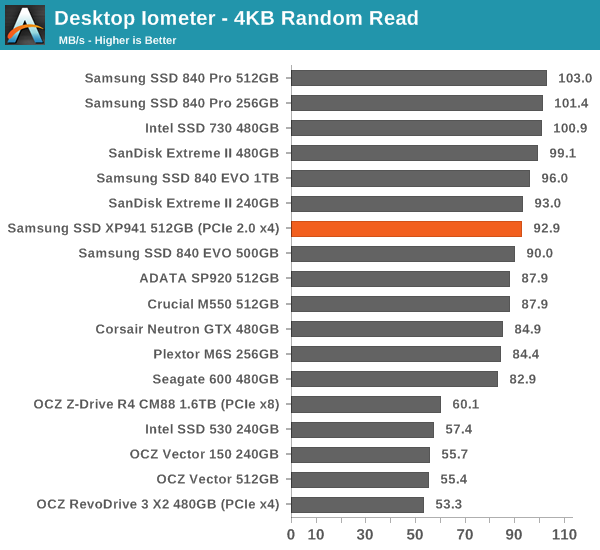
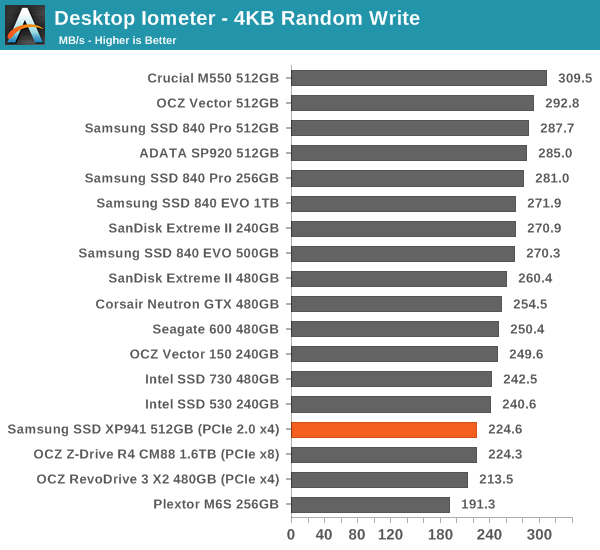
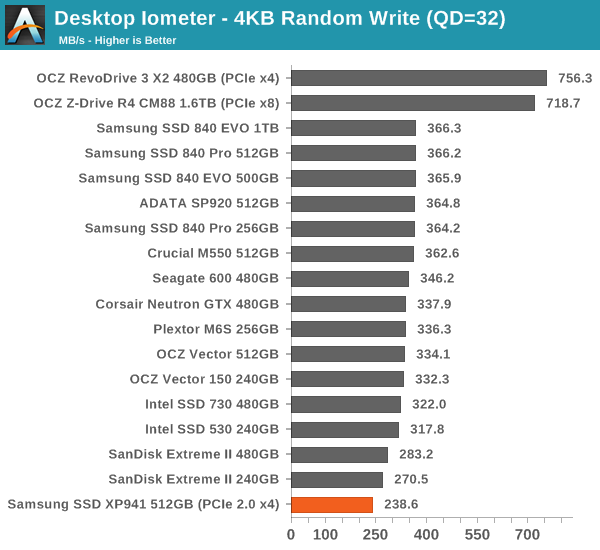
The random performance of XP941 doesn't stand out. Especially random write speeds are quite low by today's standards and queue depth scaling is close to non-existent. That said, I don't believe that high queue depth performance is really important for client workloads as our internal workload analysis shows that even under heavy use the average queue depth tends to be no more than 5. Our Storage Benches also show that even though the random performance isn't excellent, the strong sequential performance thanks to the faster PCIe interface makes up for the difference.
Sequential Read/Write Speed
To measure sequential performance we run a 1 minute long 128KB sequential test over the entire span of the drive at a queue depth of 1. The results reported are in average MB/s over the entire test length.
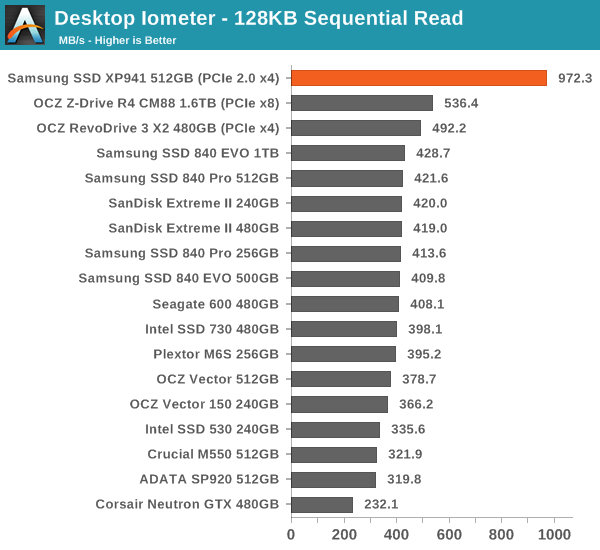
The sequential speeds are the highest we have ever tested in a consumer SSD. Even the 8-controller Z-Drive R4 behemoth can't beat the XP941, which really speaks for the efficiency of a single controller design. If you were to increase the queue depth, the Z-Drive would easily beat the XP941 since higher queue depth would increase parallelism and the Z-Drive could take advantage of all of its eight controllers. However, I was able to reach speeds of up to 1560MB/s with the XP941 at queue depth of 32, which is pretty much as fast as you can go with PCIe 2.0 x4 without tweaking any settings (the PCIe bus can be overclocked to achieve even higher speeds, though there can be a negative impact on random performance. We will investigate this at a later date).
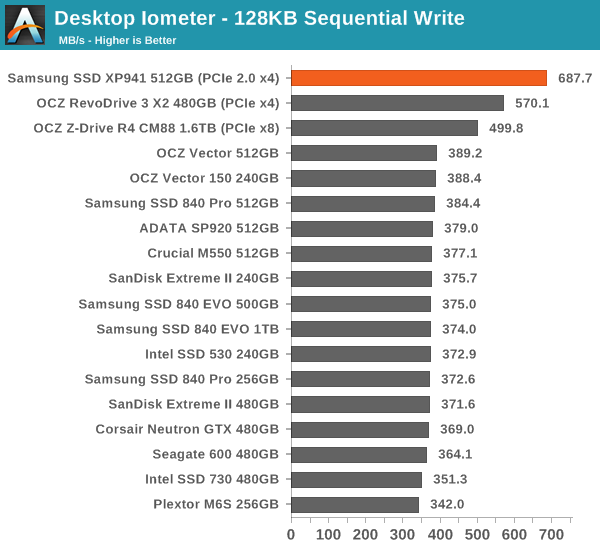
AS-SSD Incompressible Sequential Read/Write Performance
The AS-SSD sequential benchmark uses incompressible data for all of its transfers. The result is a pretty big reduction in sequential write speed on SandForce based controllers. The XP941 does brilliantly in AS-SSD as well but now the strength of eight controllers starts to show for the Z-Drive. Even then, the XP941 is still about twice as fast as the fastest SATA 6Gbps SSD.
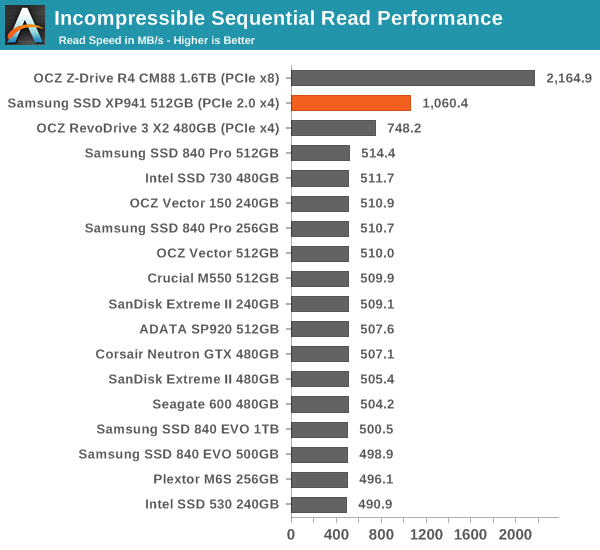
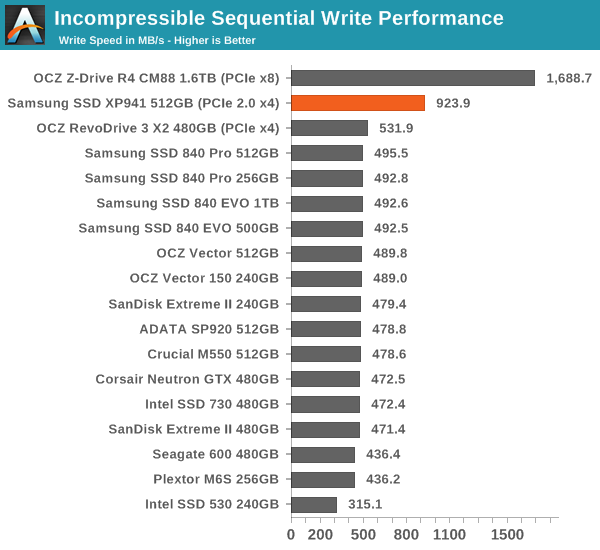










110 Comments
View All Comments
BMNify - Friday, May 16, 2014 - link
rod, if you go ,as well as Everspin, look out for Crocus Technology Russian MRAM HW makers ARM licenced their IP , and Avalanche Technology tooRamCity - Monday, May 19, 2014 - link
Yes, I will be going to Computech. I'll add those vendors to my visit list and check out what they are up to if they have a booth.RamCity - Monday, May 19, 2014 - link
I mean Computex!Jay77 - Thursday, May 15, 2014 - link
I suppose I should read more than the first and last pages if I'm going to make comments.Babar Javied - Thursday, May 15, 2014 - link
There is a mistake/typo in "Performance Consistency & Trim Validation" under the "Trim Validation" section. Below the first graph in the said section, you have wrote "doesn't treat PCIe drives the same even if the utilize the same AHCI" when you ment to say "even if THEY utilize the same AHCI"Ryan Smith - Thursday, May 15, 2014 - link
Fixed. Thank you for pointing that out.BMNify - Thursday, May 15, 2014 - link
so basically you gimped the one and only raid 0 test by not doing it in windows or even better simply boot any linux iso/usb stick and formatted the ssd-xp941 WITH the samsung "F2FS" file system for maximum speed as that is written especially for ssdKristian Vättö - Saturday, May 17, 2014 - link
I did RAID the XP941s in Windows as well but the results were similar so I figured that there is no need to report the results separately.rocky12345 - Thursday, May 15, 2014 - link
I like that there are extra speed speed in these new devices but it seems everyone is so stuck on more speed more speed..lol I am sorry but when a standard SSD can boot a windows 7 in about 6 seconds when are people going to be happy. My Asus laptop has a SSD in it & boots in about 6 to 7 seconds & things like firefox open even before my finger un-clicks the mouse button to open firefox. now everyone is saying standard SSD is to slow..lol to funny. What I would rather like to see is bigger SSD drives at a better price. We already have good speed but the big drives still cost to much for most people when they can make a 1TB SSD at about the same or just slightly more than a standard hard drive then maybe they should be more worried about all these new extreme speed drives but if they make standard SSD drives go the way of the doo doo bird then we are never going to see low priced SSD anything because they will always be treating anything SSD related as new tech just a thought.BMNify - Thursday, May 15, 2014 - link
"but it seems everyone is so stuck on more speed more speed..lol I am sorry but when a standard SSD can boot a windows 7 in about 6 seconds when are people going to be happy..."well obviously speed is not for you, but how do you expect current non volatile ram to lower in price if they don't bring out newer kit to replace it at today's higher price points !
im not sure you understand the driving forces here as regards people wish for faster data access, we really need/WANT a so called "universal non volatile ram [such as those Everspin ST-MRAM DDR3 DIMMs referenced ]" sooner than later at equivalent ddr3 2400,wideIO2,HMC speeds and configurations so we can start to take better advantage of the higher data throughput and data manipulation these bring to the table, its not good enough to x264 encode UHD content in real time right now, then and only then will we start to consider we are starting to get close to enough general speeds, ALIMO.... YMCV